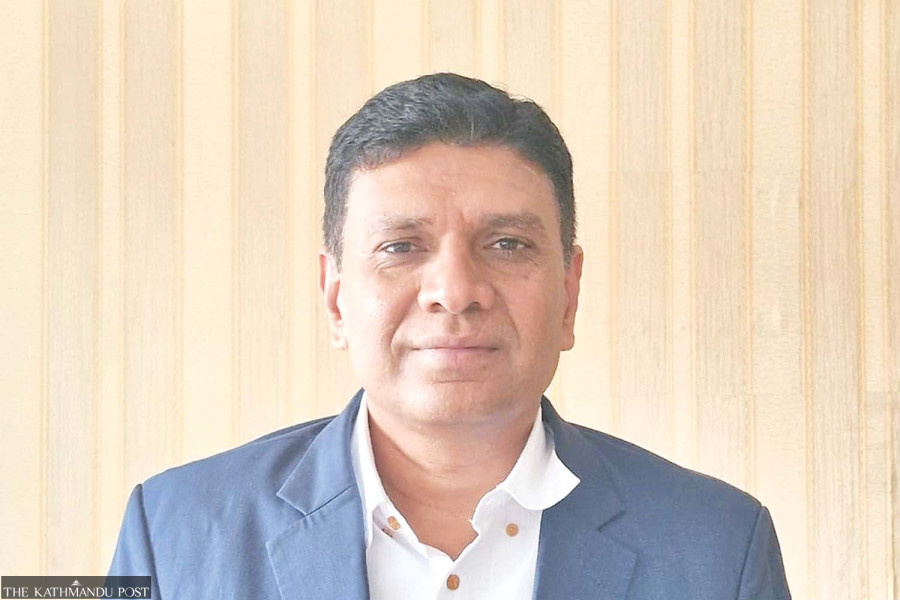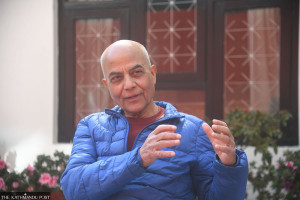Interviews
Registration makes social media platforms responsible
Roughly 80 percent of Nepali social media users are on Meta platforms, with the rest spread across other platforms.
Aarati Ray
The government’s decision to potentially ban social media platforms that fail to register has been a hot topic for some time now. Despite several deadlines issued by the Ministry of Communication and Information Technology, Meta has remained silent. To get a clearer picture, the Post’s Aarati Ray sat down with Gajendra Kumar Thakur, the ministry’s spokesperson and joint secretary. In this interview, Thakur explains the government’s rationale for pushing social media platform registration, the challenges faced so far, and the ministry’s future plans.
Could you walk us through the rationale behind the decision to mandate the registration of social media platforms like Meta?
The government’s decision is a mix of technical necessity, regulatory responsibility, and a rights-based governance approach. Currently, there are hundreds of social media platforms being used in Nepal, but we don’t have an official record of how many are operating here or who’s doing business. That’s a key reason we’ve been pushing for registration, to identify who is operating within our digital space and to establish a sense of order and accountability.
We definitely see the good sides of social media, but we also can’t ignore its harmful aspects like cyberbullying, misinformation, hate speech, and cybercrime. The ministry is serious about tackling these issues. We are not just pushing for registration. We’re also working on digital literacy, awareness campaigns, research, stakeholder engagement, drafting policies, and coordinating with law enforcement.
But for any of that to work, whether it’s an investigation or just basic collaboration, we need someone we can reach out to. A point of contact is really important. Without that, how do we even move forward or solve problems together?
We’re not asking these companies to open massive offices or hire hundreds of people in Nepal. All we’re asking for is a basic, formal point of contact, even just one representative, who can coordinate with us when necessary. We’ve been open about this from the start. We’re more than willing to listen to what these platform representatives have to say and work together in a transparent and coordinated way.
When did the government begin planning for the registration of social media platforms?
The decision to start pushing for social media platform registration began around 2022, when the ministry started reflecting on how to manage social media’s growing negative impacts, especially the tremendous rise in cybercrime. As a result, the ‘Directives Relating to the Regulation for the Usage of Social Media, 2023’ was introduced. We implemented it with the goal of safer use of digital platforms. Since, five social media platforms have completed the registration process.
There seems to be more emphasis on Meta platforms. Why so?
That’s mainly because of user volume. Meta platforms like Facebook, Instagram, and WhatsApp are by far the most widely used in Nepal. For instance, Facebook alone has over 14 million users here. Roughly 80 percent of Nepali social media users are on Meta platforms, while the remaining 20 percent are spread across other platforms.
That said, our goal isn’t to single out Meta; we want all platforms to register. But naturally, given Meta’s dominance, it’s been a major focus. In fact, we have sent official letters and notices to other platforms as well, encouraging them to register.
What are the problems emanating from the lack of registration of social media platforms in Nepal?
We’ve had several rounds of discussions with the Nepal Police Cyber Bureau, and it’s become clear that lack of registration is creating serious challenges in terms of the investigation of cybercrime. Without a registered presence or even a local point of contact for platforms like Meta, the Cyber Bureau often struggles to get timely cooperation. They face delays in accessing user information, tracking suspects, or receiving essential data. This has led to many cases being stuck or delayed.
Another key issue is that most tech platforms operate based on their global community guidelines, which don’t always align with Nepal’s laws, especially on matters like defamation, hate speech, or abusive content. What might not count as a violation on a platform like Facebook elsewhere could be a legal offence under Nepali law. If platforms were registered here, we’d be in a better position to coordinate with them for investigations and to align their guidelines with Nepal’s legal standards and cultural context.
In some situations, the content being shared can pose risks to national interest, the victim’s integrity and mental health, public order, or social harmony. If there were a local contact point, we could act immediately, ask for content removal, initiate coordination, and prevent further damage.
What other benefits do you foresee from the registration of social media platforms?
Since TikTok registered, we’ve worked closely with them on disaster mapping and digital literacy. Cooperation and communication have become much smoother with registered platforms. Social media is a strong tool for social change, and registration allows us to promote its positive uses while managing its negatives. Registered platforms can support capacity building, awareness campaigns, education, and tourism promotion. TikTok is now collaborating with the Nepal Tourism Board to boost tourism. WeTalk is also preparing to increase cooperation with us once its local infrastructure is ready.
Has Meta communicated any formal stance or submitted documentation since the April 17 virtual meeting? What’s the update?
We have not received any response since. Through diplomatic channels, we have decided to reach out again to better understand their position. That’s the latest update for now. Registration notice letters have been sent to other major platforms like X (formerly Twitter) and Imo, too, but again there has been no response.
One challenge we are facing is finding a reliable point of contact for these platforms. While big companies like Meta have representatives in South Asia, smaller platforms often do not. For them, we have used emails listed on their websites to initiate communication, but it has been difficult to establish proper dialogue without direct contact.
Despite multiple deadlines and warnings, Meta has not responded, and the government hasn’t enforced penalties. Does this owe to Nepal’s lack of regulatory and diplomatic influence over companies like Meta?
We have made every effort and requested Meta multiple times to engage with us. Perhaps they have their own challenges or perspectives, and the only way to understand and resolve those is through dialogue. But despite our efforts, they haven’t responded, and honestly, we don’t know why. If we knew, we would have addressed it already. Our aim isn’t just to force registration or ban. Banning is off the table; we want to improve the entire digital ecosystem by working closely with platforms like Meta.
That said, if, after all diplomatic and technical efforts, they continue to ignore us, the ministry’s last resort would be to consider legal actions or restrictions. But we would only take that step after exhausting every possible means of communication and cooperation.
Could Meta’s continued silence be due to Nepal’s relatively smaller market size?
I don’t think that’s the case. There are over 14 million Nepali users on Facebook alone, which might be smaller compared to our neighbouring countries like India, but relative to Nepal’s population, that’s a significant number. We believe Meta should recognise the potential of the Nepali market and respect the trust Nepali users have shown. Even countries with much smaller populations expect platforms to register and be accountable.
The size of a market shouldn’t exempt any company from responsibility. If a company is doing business and serving users in a country, it must contribute to building a safe and accountable digital ecosystem everywhere.
Some people say the government’s warnings to ban social media platforms came at a time of public frustration with the government, and that it might be a way to control online expression.
It’s nothing like that. There’s no political repression involved. We’ve been working on this since 2022, and it has nothing to do with politics or controlling digital expression. Our focus is simply on creating a safe and healthy social media environment. This push for registration is a genuine policy initiative, not a political move to control influential communication platforms.
What will be the next concrete steps from the ministry in social media regulation and registration?
Beyond sending letters to mandate registration, we are working on a broader effort to make Nepal’s digital space safer and rights-protected.
We have conducted detailed studies on social media’s positives and negatives. Based on them, we are developing committee standard guidelines for key stakeholders and users of social media. These guidelines won’t be mandatory rules but serve as moral and ethical standards to ensure accountability and user protection across the social media ecosystem. We expect to finalise these guidelines within two months.
For these efforts, we’re collaborating closely with UNESCO and other national and international organisations. We regularly engage in discussions to gather feedback and suggestions on digital literacy, capacity building, digital infrastructure, and more.
Regarding Meta platforms, we’re planning to hold more internal discussions, including talks with the foreign ministry and diplomatic channels, before deciding on any specific steps. From what I understand, the strict ban deadlines we heard about earlier are unlikely to be enforced.




 10.12°C Kathmandu
10.12°C Kathmandu



.jpg&w=200&height=120)








